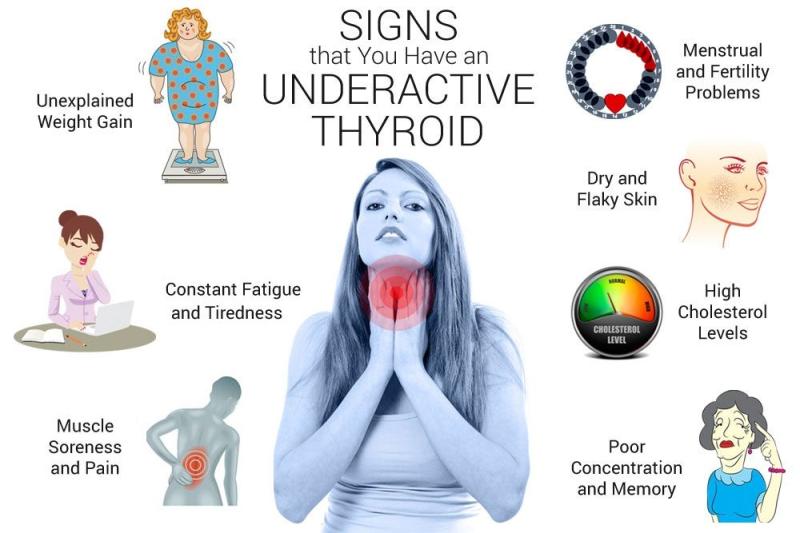What medications can cause hypothyroidism?
There are several medications that can potentially lead to or exacerbate hypothyroidism, a condition in which the thyroid gland doesn't produce enough thyroid hormones. Here are some of the medications and drug classes known to be associated with hypothyroidism:
Lithium: This medication is commonly used to treat bipolar disorder and certain types of depression. Long-term use of lithium can interfere with thyroid function and lead to hypothyroidism.
Amiodarone: Amiodarone is an antiarrhythmic medication used to treat irregular heart rhythms. It can have adverse effects on the thyroid, potentially causing either hypothyroidism or hyperthyroidism.
Interferon-alpha and Interleukin-2: These medications are used in the treatment of various medical conditions, including some forms of cancer and viral infections. They can affect the thyroid and lead to hypothyroidism.
Tyrosine Kinase Inhibitors: Some cancer medications, like imatinib, sunitinib, and sorafenib, can affect the thyroid gland and thyroid hormone production.
Immune Checkpoint Inhibitors: Medications like pembrolizumab and nivolumab, used in cancer immunotherapy, can lead to autoimmune thyroid disorders, including hypothyroidism.
Radiation Therapy to the Neck: Radiation therapy, particularly when directed at the head and neck region, can damage the thyroid gland and lead to hypothyroidism.
Cytokines: Certain medications that contain cytokines, such as interferons and interleukins, can disrupt thyroid function.
Anti-thyroid Medications: While used to treat hyperthyroidism, antithyroid medications like propylthiouracil (PTU) and methimazole can, in some cases, lead to hypothyroidism when not used properly or when taken for an extended period.
Iodine-Containing Medications: Some medications and supplements that contain high levels of iodine can interfere with thyroid function, leading to hypothyroidism. This is more common in individuals who are sensitive to iodine.
It's important to note that not everyone who takes these medications will develop hypothyroidism, and the risk varies depending on factors like the duration of medication use and individual susceptibility. If you are prescribed any of these medications or are concerned about the potential impact on your thyroid function, it's essential to communicate with your healthcare provider. Regular monitoring of thyroid function may be recommended while taking these medications to detect and address any thyroid-related issues early. Adjustments to the medication regimen or additional thyroid treatment may be necessary in some cases.
Here is an overview of the medications linked to hypothyroidism as a side effect:
Medications Linked to Hypothyroidism
Several medications have been linked to the development of hypothyroidism as a side effect. Some of the most common include:
Amiodarone: Amiodarone is an antiarrhythmic medication used to treat irregular heartbeats. It can interfere with the thyroid gland's ability to produce hormones, leading to hypothyroidism.
Lithium: Lithium is a mood stabilizer used to treat bipolar disorder. It can block the uptake of iodine by the thyroid gland, which is necessary for the production of thyroid hormones.
Interferon: Interferon is a type of medication used to treat viral infections and some types of cancer. It can cause inflammation of the thyroid gland, which can lead to hypothyroidism.
Iodine-containing medications: Some medications, such as cough suppressants and expectorants, contain iodine. High doses of iodine can interfere with the thyroid gland's production of hormones.
How These Drugs Contribute to Thyroid Dysfunction
The exact mechanisms by which these medications cause hypothyroidism vary depending on the medication. However, some of the common mechanisms include:
Interfering with the production of thyroid hormones: Some medications, such as amiodarone, can interfere with the thyroid gland's ability to produce hormones.
Blocking the uptake of iodine: Iodine is necessary for the production of thyroid hormones. Some medications, such as lithium, can block the uptake of iodine by the thyroid gland.
Causing inflammation of the thyroid gland: Inflammation of the thyroid gland can damage the gland and reduce its ability to produce hormones.
What Patients Should Be Aware Of
If you are taking any of the medications listed above, it is important to be aware of the potential risk of developing hypothyroidism. Talk to your doctor about your risk factors for hypothyroidism and what you should look for in terms of symptoms.
Alternatives or Strategies to Manage Medication-Induced Hypothyroidism
There are a few alternatives or strategies to manage medication-induced hypothyroidism. These include:
Monitoring thyroid hormone levels: Regular monitoring of thyroid hormone levels can help to detect hypothyroidism early on, when it is easier to treat.
Adjusting medication dosage: In some cases, the dosage of the medication that is causing hypothyroidism can be adjusted to reduce the risk of side effects.
Switching to a different medication: If there is no other way to manage the side effects of a medication, the medication may need to be switched to a different one.
Thyroid hormone replacement therapy: If hypothyroidism develops, it can be treated with thyroid hormone replacement therapy.
It is important to talk to your doctor about the best way to manage medication-induced hypothyroidism. They can help you to develop a plan that is right for you.












